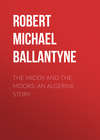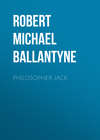Buch lesen: «The Middy and the Moors: An Algerine Story», Seite 6
Chapter Eight
A Severe Trial—Secret Communication under Difficulties, and Sudden Flight
The devotion of our middy to the fine arts was so satisfactory in its results that Ben-Ahmed set him to work at various other apartments in his dwelling when the first drawing was nearly finished.
We say nearly finished, because, owing to some unaccountable whim, the Moor would not allow the first drawing to be completed. When Foster had finished a painting of the central court his master was so pleased with the way in which he had drawn and coloured the various shrubs and flowers which grew there, that he ordered him forthwith to commence a series of drawings of the garden from various points of view. In one of these Foster introduced such a life-like portrait of Peter the Great that Ben-Ahmed was charmed, and immediately gave orders to have most of his slaves portrayed while engaged in their various occupations.
In work of this kind many months were spent, for Foster was a painstaking worker. He finished all his paintings with minute care, having no capacity for off-hand or rapid sketching. During this period the engrossing nature of his work—of which he was extremely fond—tended to prevent his mind from dwelling too much on his condition of slavery, but it was chiefly the knowledge that Hester Sommers was under the same roof, and the expectation that at any moment he might encounter her, which reconciled him to his fate, and even made him cheerful under it.
But as week after week passed away, and month after month, without even a flutter of her dress being seen by him, his heart failed him again, and he began to fear that Ben-Ahmed’s son Osman might have returned and carried her off as his bride, or that she might have been sold to some rich Moor—even to the Dey himself! Of course his black friend comforted him with the assurance that Osman had not returned, and that Ben-Ahmed was not the man to sell a slave he was fond of; but such assurances did not afford him much comfort. His mind was also burdened with anxiety about his mother and sister.
He was sitting one day while in this state at an angle of the garden trying to devote his entire mind to the portrayal of a tree-fern, and vainly endeavouring to prevent Hester Sommers from coming between him and the paper, when he was summoned to attend upon Ben-Ahmed. As this was an event of by no means uncommon occurrence, he listlessly gathered up his materials and went into the house.
He found the Moor seated cross-legged on a carpet, smoking his hookah, with only a negress in attendance. His easel, he found, was already placed, and, to his surprise, he observed that the original drawing with which his career as a painter had commenced was placed upon it.
“I wish you to finish that picture by introducing a figure,” said Ben-Ahmed, with solemn gravity.
He spoke in Lingua Franca, which Foster understood pretty well by that time.
It now became evident to him why the drawing of the room had been left unfinished, and he thought it probable that modesty—or, perhaps, a difficulty in overcoming the Moslem’s dislike to being transferred to canvas at all—had caused the delay.
“In what attitude do you wish to be painted?” asked the middy, as he moved the easel a little, and took a professional, head-on-one-side look at his subject.
“In no attitude,” returned the Moor gravely.
“Pardon me,” said Foster in surprise. “Did you not say that—that—”
“I said that I wish you to finish the drawing by introducing a figure,” returned Ben-Ahmed, taking a long draw at the hookah.
“Just so—and may I ask—”
“The figure,” resumed the Moor, taking no notice of the interruption, “is to be one of my women slaves.”
Here he turned his head slightly and gave a brief order to the negress in waiting, who retired by the door behind her.
The middy stood silent for a minute or so, lost in wonder and expectation, when another door opened and a female entered. She was gorgeously dressed, and closely veiled, so that her face was entirely concealed; nevertheless, George Foster’s heart seemed to bound into his throat and half choke him, for he knew the size, air, and general effect of that female as well as if she had been his own mother.
The Moor rose, led her to a cushion, and bade her sit down. She did so with the grace of Venus, and then the Moor removed her veil—looking fixedly at the painter as he did so.
But the middy had recovered self-possession by that time. He was surprised as well as deeply concerned to observe that Hester’s beautiful face was very pale, and her eyes were red and swollen, as if from much crying, but not a muscle in his stolid countenance betrayed the slightest emotion. He put his head a little to one side, in the orthodox manner, and looked steadily at her. Then he looked at his painting and frowned as if considering the best spot in which to place this “figure.” Then he began to work.
Meanwhile the Moor sat down to smoke in such a position that he could see both painter and sitter.
It was a severe test of our middy’s capacity to act the “hyperkrite!” His heart was thumping at his ribs like a sledge-hammer anxious to get out. His hand trembled so that he could scarcely draw a line, and he was driven nearly mad with the necessity of presenting a calm, thoughtful exterior when the effervescence within, as he afterwards admitted, almost blew his head off like a champagne cork.
By degrees he calmed down, ceased breaking the point of his pencil, and used his india-rubber less frequently. Then he took to colour and the brush, and here the tide began to turn in his favour. Such a subject surely never before sat to painter since the world began! He became engrossed in his work. The eyes became intent, the hand steady, the heart regular, the whole man intense, while a tremendous frown and compressed lips told that he “meant business!”
Not less intense was the attention of the Moor. Of course we cannot tell what his thoughts were, but it seemed not improbable that his eccentric recklessness in violating all his Mohammedan habits and traditions as to the seclusion of women, by thus exposing Hester to the gaze of a young infidel, had aroused feelings of jealousy and suspicion, which were not natural to his kindly and un-Moorish cast of soul.
But while young Foster was employed in the application of his powers to energetic labour, the old Moor was engaged in the devotion of his powers to the consumption of smoke. The natural results followed. While the painter became more and more absorbed, so as to forget all around save his sitter and his work, the Moor became more and more devoted to his hookah, till he forgot all around save the soporific influences of smoke. An almost oppressive silence ensued, broken only by the soft puffing of Ben-Ahmed’s lips, and an occasional change in the attitude of the painter. And oh! how earnestly did that painter wish that Ben-Ahmed would retire—even for a minute—to give him a chance of exchanging a word or two with his subject.
But the Moor was steady as a rock. Indeed he was too steady, for the curtains of his eyes suddenly fell, and shut in the owlish glare with which he had been regarding the middy. At the same moment a sharp click and clatter sent an electric thrill to the hearts of all. The Moor’s mouthpiece had fallen on the marble floor! Ben-Ahmed picked it up and replaced it with severe gravity, yet a faint flicker of red in his cheek, and a very slight air of confusion, showed that even a magnificent Moor objects to be caught napping by his slaves.
This incident turned Foster’s thoughts into a new channel. If the Moor should again succumb to the demands of nature—or the influence of tobacco—how could he best make use of the opportunity? It was a puzzling question. To speak—in a whisper or otherwise—was not to be thought of. Detection would follow almost certainly. The dumb alphabet would have been splendid, though dangerous, but neither he nor Hester understood it. Signs might do. He would try signs, though he had never tried them before. What then? Did not “Never venture, never win,” “Faint heart never won,” etcetera, and a host of similar proverbs assure him that a midshipman, of all men, should “never say die.”
A few minutes more gave him the chance. Again the mouthpiece fell, but this time it dropped on the folds of the Moor’s dress, and in another minute steady breathing told that Ben-Ahmed was in the land of Nod—if not of dreams.
A sort of lightning change took place in the expressions of the young people. Hester’s face beamed with intelligence. Foster’s blazed with mute interrogation. The little maid clasped her little hands, gazed upwards anxiously, looked at the painter entreatingly, and glanced at the Moor dubiously.
Foster tried hard to talk to her “only with his eyes.” He even added some amazing motions of the lips which were meant to convey— “What’s the matter with you?” but they conveyed nothing, for Hester only shook her head and looked miserable.
A mild choke at that moment caused the maid to fall into statuesque composure, and the painter to put his frowning head tremendously to one side as he stepped back in order to make quite sure that the last touch was really equal, if not superior, to Michael Angelo himself!
The Moor resumed his mouthpiece with a suspicious glance at both slaves, and Foster, with the air of a man who feels that Michael was fairly overthrown, stepped forward to continue his work. Truly, if Peter the Great had been there at the time he might have felt that he also was fairly eclipsed in his own particular line!
Foster now became desperate, and his active mind began to rush wildly about in quest of useful ideas, while his steady hand pursued its labour until the Moor smoked himself into another slumber.
Availing himself of the renewed opportunity, the middy wrapped a small piece of pencil in a little bit of paper, and, with the reckless daring of a man who had boarded a pirate single-handed, flung it at his lady-love.
His aim was true—as that of a midshipman should be. The little bomb struck Hester on the nose and fell into her lap. She unrolled it quickly, and an expression of blank disappointment was the result, for the paper was blank and she had expected a communication. She looked up inquiringly, and beaming intelligence displaced the blank when she saw that Foster made as though he were writing large text on his drawing. She at once flattened the bit of paper on her knee—eyeing the Moor anxiously the while—and scribbled a few words on the paper.
A loud cough from Foster, followed by a violent sneeze, caused her to crush the paper in her hand and again become intensely statuesque. Prompt though she was, this would not have saved her from detection if the violence of Foster’s sneeze had not drawn the Moor’s first glance away from her and towards himself.
“Pardon me,” said the middy, with a deprecatory air, “a sneeze is sometimes difficult to repress.”
“Does painting give Englishmen colds?” asked the Moor sternly.
“Sometimes it does—especially if practised out of doors in bad weather,” returned Foster softly.
“H’m! That will do for to-day. You may return to your painting in the garden. It will, perhaps, cure your cold. Go!” he added, turning to Hester, who immediately rose, pushed the paper under the cushion on which she had been sitting, and left the room with her eyes fixed on the ground.
As the cat watches the mouse, Foster had watched the girl’s every movement while he bent over his paint-box. He saw where she put the paper. In conveying his materials from the room, strange to say, he slipped on the marble floor, close to the cushion, secured the paper as he rose, and, picking up his scattered things with an air of self-condemnation, retired humbly—yet elated—from the presence-chamber.
Need we say that in the first convenient spot he could find he eagerly unrolled the paper, and read—
“I am lost! Oh, save me! Osman has come! I have seen him! Hateful! He comes to-morrow to—”
The writing ended abruptly.
“My hideous sneeze did that!” growled Foster savagely. “But if I had been a moment later Ben-Ahmed might have—well, well; no matter. She must be saved. She shall be saved!”
Having said this, clenched his teeth and hands, and glared, he began to wonder how she was to be saved. Not being able to arrive at any conclusion on this point, he went off in search of his friend Peter the Great.
He found that worthy man busy mending a rake in a tool-house, and in a few eager words explained how matters stood. At first the negro listened with his wonted, cheerful smile and helpful look, which hitherto had been a sort of beacon-light to the poor midshipman in his troubles, but when he came to the piece of paper and read its contents the smile vanished.
“Osman home!” he said. “If Osman come back it’s a black look-out for poor Hester! And the paper says to-morrow,” cried Foster; “to take her away and marry her, no doubt. Peter, I tell you, she must be saved to-night! You and I must save her. If you won’t aid me I will do it alone—or die in the attempt.”
“Geo’ge, if you was to die a t’ousan’ times dat wouldn’t sabe her. You know de Kasba?”
“Yes, yes—go on!”
“Well, if you was to take dat on your shoulders an’ pitch ’im into de sea, dat wouldn’t sabe her.”
“Yes it would, you faint-hearted nigger!” cried the middy, losing all patience, “for if I could do that I’d be able to wring the neck of every pirate in Algiers—and I’d do it too!”
“Now, Geo’ge, keep cool. I’s on’y p’intin’ out what you can’t do; but p’r’aps somet’ing may be done. Yes,” (he struck his forehead with his fist, as if to clinch a new idea),—“yes, I knows! I’s hit it!”
“What!” cried Foster eagerly.
“Dat you’s got nuffin to do wid,” returned the negro decisively. “You must know not’ing, understand not’ing, hear an’ see not’ing, for if you do you’ll be whacked to deaf. Bery likely you’ll be whacked anyhow, but dat not so bad. You must just shut your eyes an’ mout’ an’ trust all to me. You understand, Geo’ge?”
“I think I do,” said the relieved middy, seizing the negro’s right hand and wringing it gratefully. “Bless your black face! I trust you from the bottom of my soul.”
It was, indeed, a source of immense relief to poor Foster that his friend not only took up the matter with energy, but spoke in such a cheery, hopeful tone, for the more he thought of the subject the more hopeless did the case of poor Hester Sommers appear. He could of course die for her—and would, if need were—but this thought was always followed by the depressing question, “What good would that do to her?”
Two hours after the foregoing conversation occurred Peter the Great was seated in a dark little back court in a low coffee-house in one of the darkest, narrowest, and most intricate streets of Algiers. He sat on an empty packing-box. In front of him was seated a stout negress, in whom an Ethiopian might have traced some family likeness to Peter himself.
“Now, Dinah,” said he, continuing an earnest conversation which had already lasted for some time, “you understand de case properly—eh?”
“Ob course I does,” said Dinah.
“Well, den, you must go about it at once. Not a minute to lose. You’ll find me at de gardin door. I’ll let you in. You know who you’s got to sabe, an’ you must find out your own way to sabe her, an’—now, hol’ your tongue! You’s just a-goin’ to speak—I must know nuffin’. Don’ tell me one word about it. You’s a cleber woman, Dinah.”
“Yes, my brudder. I wasn’t born yesterday—no, nor yet the day before.”
“An’, Samson, will you trust him?”
“My husband is as good as gold. I trust him wid eberyt’ing!” replied this pattern wife.
“An’ Youssef—what ob him?”
“He’s more’n t’ree quarters blind. Kin see not’ing, an’ understan’s less.”
“Dinah, you’s a good woman,” remarked her appreciative brother, as he rose to depart. “Now, remember, dis am de most important job you an’ I hab had to do since we was took by de pirits out ob de same ship. An’ I do t’ink de Lord hab bin bery good to us, for He’s gi’n us good massas at last, though we had some roughish ones at fust. Foller me as quick as you can.”
Dinah, being a warm-hearted woman, and very sympathetic, did not waste time. She reached Ben-Ahmed’s villa only half an hour later than her brother, with a basket of groceries and other provisions that Peter had purchased in town. Peter took care that the young negress, whom we have already introduced as an attendant in the house, should be sent to receive the basket, and Dinah took care that she should not return to the house until she had received a bouquet of flowers to present to the young English girl in the harem. Inside of this bouquet was a little note written by Peter. It ran thus—
“Tri an git owt to de gardin soons yoo kan.”
When Hester Sommers discovered this note, the first ray of hope entered into her fluttering heart, and she resolved to profit by it.
Meanwhile, Dinah, instead of quitting the place after delivering her basket, hid herself in the shrubbery. It was growing dark by that time, and Peter made a noisy demonstration of sending one of the slaves to see that the garden gate was locked for the night. Thereafter he remained all the rest of the evening in his own apartments in pretty loud conversation with the slaves.
Suddenly there was a cry raised, and several slaves belonging to the inner household rushed into the outer house with glaring eyes, shouting that the English girl could not be found.
“Not in de house?” cried Peter, starting up in wild excitement.
“No—nowhar in de house!”
“To de gardin, quick!” shouted Peter, leading the way, while Ben-Ahmed himself, with undignified haste, joined in the pursuit.
Lanterns were lighted, and were soon flitting like fireflies all over the garden, but no trace of the fugitive was found. Peter entered into the search with profound interest, being as yet utterly ignorant of the method of escape devised by his sister. Suddenly one of the slaves discovered it. A pile of empty casks, laid against the wall in the form of a giant staircase, showed how Hester had climbed, and a crushed bush on the other side testified to her mode of descent.
Ben-Ahmed and Peter ran up to the spot together. “Dey can’t hab gone far, massa. You want de horses, eh?” asked the latter.
“Yes. Two horses, quick!”
Peter went off to the stables in hot haste, remarking as he ran—
“What a hyperkrite I is, to be sure!”
Chapter Nine
Hester introduced to a New Home and New Friends under Peculiar Circumstances, and a New Name
Long before their flight was discovered Hester Sommers and Dinah had penetrated into a dense thicket, where the negress proceeded to produce a wonderful metamorphosis.
“Now, my dear,” she said, hastily undoing a large bundle which she carried, while Hester, panting and terrified, sat down on the grass beside her, “don’t you be frighted. I’s your fri’nd. I’s Dinah, de sister ob Peter de Great, an’ de fri’nd also ob Geo’ge. So you make your mind easy.”
“My mind is quite easy,” said Hester; “and even if you were not Peter’s sister, I’d trust you, because of the tone of your kind voice. But who is Geo’ge?”
Dinah opened her eyes very wide at this question, for Peter had already enlightened her mind a little as to the middy’s feelings towards Hester.
“You not know Geo’ge?” she asked.
“Never heard of him before, Dinah.”
“Geo’ge Foster?”
“Oh, I understand! It was your way of pronouncing his name that puzzled me,” returned the girl, with a faint smile. “I’m glad you are his friend, too, poor fellow!”
“Well, you is a babby!” exclaimed Dinah, who had been mixing up what appeared to be black paint in a wooden bowl. “Now, look yar, don’t you be frighted. It’s a matter ob life an’ deaf, you know, but I’s your fri’nd! Jest you do zackly what I tells you.”
“Yes, Dinah,” said Hester, alarmed, notwithstanding, by the earnestness and solemnity of her new friend, “what am I to do?”
“You come yar, an’ don’t moob whateber I does to you. Dere, I’s goin’ to make you a nigger!”
She applied a large brush to Hester’s forehead, and drew it thence down her left cheek, under her chin, up the right cheek, and back to the starting point, thus producing a black band or circle two inches broad.
“Now shut your bootiful eyes,” she said, and proceeded to fill up the circle.
In a quarter of an hour Hester was as black as the ace of spades—neck, hands, and arms, as well as face—her fair hair was effectually covered and concealed by a cotton kerchief, and then her dress was changed for the characteristic costume of negro women.
“Now your own mudder wouldn’t know you,” said Dinah, stepping back to survey her work, and, strange to say, putting her black head quite artistically a little on one side. “You’s a’most as good-lookin’ as myself—if you was on’y a little fatter. Now, mind, you’s a dumb gal! Can’t speak a word. Don’t forgit dat. An’ your name’s Geo’giana. Come along.”
Leaving her fine clothes concealed in a deep hole, Hester followed her companion as fast as she could. On returning to the road Dinah took her friend by the hand and helped her to run for a considerable distance. Then they walked, and then ran again, until poor Hester was almost exhausted.
Resuming their walk after a short rest, they gained the main road and met with several people, who paid no attention to them whatever, much to Hester’s relief, for she had made sure of being detected. At last they reached the city gate, which was still open, as the sun had not yet set. Passing through unchallenged, Dinah at once dived into a maze of narrow streets, and, for the first time since starting, felt comparatively safe.
Fortunately for the success of their enterprise, the negress costume fitted loosely, so that the elegance of Hester’s form was not revealed, and her exhaustion helped to damage the grace of her carriage!
“Now, dearie, you come in yar an’ rest a bit,” said Dinah, turning into a dark cellar-like hole, from which issued both sounds and smells that were not agreeable. It was the abode of one of Dinah’s friends—also a negress—who received her with effusive goodwill.
Retiring to the coal-hole—or some such dark receptacle—Dinah held her friend in conversation for about a quarter of an hour, during which time several hearty Ethiopian chuckles were heard to burst forth. Then, returning to the cellar, Dinah introduced her friend to Hester as Missis Lilly, and Hester to Missis Lilly as Miss Geo’giana.
Wondering why her friend had selected for her the name—if she remembered rightly—of one of Blue Beard’s wives, Hester bowed, and was about to speak when Dinah put her flat nose close to hers and sternly said, “Dumb.”
“Moreober,” she continued, “you mustn’t bow like a lady, or you’ll be diskivered ’mediately. You must bob. Sally!”
This last word was shouted. The instant effect was the abrupt stoppage of one of the disagreeable sounds before referred to—a sound as of pounding—and the appearance of a black girl who seemed to rise out of a pit in the floor at the darkest end of the cellar.
“Sally, show dis yar stoopid gal how to bob.”
The girl instantly broke off, so to speak, at the knees for a moment, and then came straight again.
“Now, Geo’giana, you bob.”
Hester entered into the spirit of the thing and broke off admirably, whereat Dinah and Lilly threw back their heads and shook their sides with laughter. Sally so far joined them as to show all her teeth and gums. Otherwise she was expressionless.
“Now you come yar wid me into dis room,” said Dinah, taking Hester’s hand and heading her along a passage which was so profoundly dark that the very walls and floor were invisible. Turning suddenly to the left, Dinah advanced a few paces and stood still.
“You stop where you is, Geo’giana, till I gits a light. Don’t stir,” she said, and left her.
A feeling of intense horror began to creep over the poor girl when she was thus left alone in such a horrible place, and she began almost to regret that she had forsaken the comfortable home of the Moor, and to blame herself for ingratitude. In her agony she was about to call aloud to her negro friend not to forsake her, when the words, “Call upon Me in the time of trouble,” occurred to her, and, falling on her knees, she cast herself upon God.
She was not kept waiting long. Only a minute or two had elapsed when Dinah returned with a candle and revealed the fact that they stood in a small low-roofed room, the brick floor of which was partially covered with casks, packing-cases, and general lumber.
“Dis am to be your room, Geo’giana,” said her friend, holding the candle over her head and surveying the place with much satisfaction.
Poor Hester shuddered.
“It is an awful place,” she said faintly.
“Yes, it am a awrful good place,” said Dinah, with satisfaction. “Not easy to find you yar; an’ if dey did git dis lengt’ widout breakin’ dere legs, dere’s a nice leetil hole yar what you could git in an’ larf to youself.”
She led the poor girl to the other end of the room, where, in a recess, there was a boarded part of the wall. Removing one of the boards, she disclosed an opening.
“Das a small hole, Geo’giana, but it’s big enough to hold you, an’ when you’s inside you’ve on’y got to pull de board into its place, and fix it—so.”
Setting down the candle, the woman stepped into the hole, and went through the performance that would devolve upon Hester in case of emergency.
“But why leave me here at all?” pleaded Hester, when Dinah had exhausted her eulogy of the hiding-place. “Why not take me to your own home?”
“Cause it’s not so safe as dis,” answered Dinah. “P’r’aps in time you may come dere—not now. Moreober, Missis Lilly is a fuss-rate creetur, most as good as myself, if her temper was a leetil more ’eavenly. But she’s a winged serubim wid dem as don’t rile ’er, an’ she’ll be awrful good to you for my sake an’ Peter’s. You see, we was all on us took by the pints at de same time, and we’re all Christ’ns but ob course we don’t say much about dat yar!”
“And am I to be always dumb—never to speak at all?” asked Hester, in a rather melancholy tone.
“Oh! no—bress you! It’s on’y when you’re in de front or outside dat you’s dumb. When you’s back yar you may speak to Lilly an’ Sally much as you like, on’y not too loud; an’ keep your eyes open, an’ your ears sharp always. If you don’t it’s lost you will be. Don’t forgit Osman!”
Hester shuddered again; said that she would never forget Osman, and would be as careful and attentive to orders as possible.
“An’ dey’ll gib you a little work to do—not much—on’y a little. When peepil speak to you, just point to your ears and mout’, an’ shake your head. Das enuff. Dey won’t boder you arter dat. Now, dearie, I must go. I’ll come an’ see you sometimes—neber fear. What’s to become ob you in de long-run’s more’n I kin tell, for it’s Peter de Great as’ll hab to settle dat kestion. You’s in his hands. I knows not’ing, so you’ll hab to be patient.”
Patient, indeed! Little did that poor painted slave think what demands would yet be made upon her patience. Full two months elapsed before she again saw Peter, or heard anything about Ben-Ahmed and her former friends at Mustapha!
Meanwhile, Dinah having departed, she wisely set herself to make the most of her new friends.
Mrs Lilly she soon found to be quite as amiable as Dinah had described her. She and Sally were slaves to the Moor who dwelt in the house which formed the superstructure of their cellars; but, unlike white slaves, they were allowed a good deal of personal liberty; first, because there was no danger of their running away, as they had no place to run to; second, because their master wanted them to buy and sell vegetables and other things, in order that he might reap the profit; and, last, because, being an easy-going man, the said master had no objection to see slaves happy as long as their happiness did not interfere in any way with his pleasure.
“Now, Geo’giana,” said Mrs Lilly, in the course of their first conversation, “my massa he neber come down yar, nor trouble his head about us, as long’s I take him a leetle money ebery day, an’ nobody else hab got a right to come, so you’s pretty safe if dey don’t send de janissaries to make a sarch—an’ if dey do, you know whar to go. I’ll tell massa we make more money if I gits anoder slabe-gal, an’ he’ll agree, for he agrees to eberyt’ing ob dat sort! Den he’ll forgit all about it, an’ den you an’ Sally kin go about town what you like.”
“But I fear, Mrs Lilly, that I won’t be able to help you to make more money,” objected Hester timidly.
“Oh yes, you will. You’ll larn to ’broider de red an’ blue slippers. Das pay well when neatly done, an’ I kin see by de shape ob your fingers you do it neatly. You’s hungry now, I darsay, so go to work at your grub, an’ den I’ll show you what to do.”
Somewhat comforted by the kindly tone and motherly bearing of Mrs Lilly, Hester went into one of the dark cellar-like rooms of the interior of her new home, and found it to be a sort of kitchen, which borrowed its light from the outer room by means of a convenient wall that was white-washed for the purpose of transmitting it. This reflector was not an eminent success, but it rendered darkness visible. At the time we write of, however, the sun having set, the kitchen was lighted by a smoky oil-lamp of classic form and dimness. Here she found Sally busy with her evening meal.
Sally was apparently about as little of a human being as was consistent with the possession of a human form and the power of speech. Most of her qualities seemed to be negative—if we may say so. She was obviously not unamiable; she was not unkind; and she was not sulky, though very silent. In fact, she seemed to be the nearest possible approach to a human nonentity. She may be described as a black maid-of-all-work, but her chief occupation was the pounding of roasted coffee-beans. This operation she performed in the pit in the floor before mentioned, which may be described as a hole, into which you descended by four steps from the front room. As the front room itself was below the level of the street, it follows that the “pit” penetrated considerably deeper into the bowels of the earth. In this pit Sally laboured hard, almost day and night, pounding the coffee-beans in an iron mortar, with an iron pestle so heavy that she had to stand up and use it with both hands. She had got into the habit of relieving herself by an audible gasp each time she drove the pestle down. It was not a necessary gasp, only a remonstrative one, as it were, and conveyed more to the intelligent listener than most of the girl’s average conversation did. This gasp was also one of the disagreeable sounds which had saluted the ears of Hester on her first entrance into the new home.




















